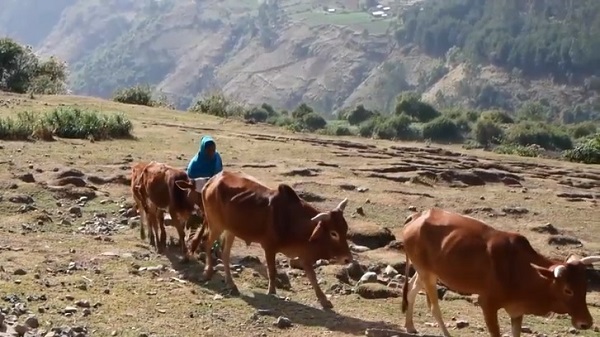
Extreme rainfall and flooding in the Choke watershed have carved out gullies on steep slopes, and caused significant damage to agriculture, infrastructure and property along the Nile.
By Dagim Terefe (Thomson Reuters Foundation)
CHOKE, Ethiopia – Sloping fields of barley and potatoes stretching far into the distance are a common sight in the mountains of Ethiopia’s northwestern Amhara Regional State.
Local farmer Babel Tena, in a faded jacket and head scarf, has been cultivating low-yielding varieties of barley, beans and potatoes here for more than 40 years.
“Our soil and produce have been washed away by (rain) runoff because we farm on the side of the mountain,” said the 58-year-old, plowing his field with an ox and a horse.
Tena and other farmers used to grow beans here, but the climate has now become too dry, he said, frowning.
“I have nine children. I have no farmland to hand over,” he said, blaming a scarcity of land and a growing population.
The climate of the Choke Mountain watershed in the Upper Blue Nile Highlands is changing as the planet warms.
Studies by Debre Markos University show the area also faces severe land degradation due to human settlement, overgrazing, deforestation and unsustainable agricultural practices.
At an elevation of 4,000 meters (13,120 ft), the Choke Mountain range has a tropical alpine ecosystem and is home to more than 150,000 people living in six districts.
Farmers and herders like Tena know their land and water sources are under pressure but have no other options for survival apart from growing crops and breeding animals.
They worry the government will close off the areas they now use in an attempt to restore the local environment.
“We understand the Choke ecosystem has been degraded and the climate has changed but the question is where (would) we live and farm, and our livestock graze?” Tena asked.
Sewalew Fentaw, a 40-year-old sheep herder and father of three, lives an hour by road from Debre Markos city.
If the grazing land is enclosed, “my fate will be migration”, he said.
According to Sewalew, inhabitants of the Choke area aged between 20 and 40 have no other choice but to work as herders due to a scarcity of cultivable land.
Most rural families combine livestock and crop farming on small plots.
Belachew Miherete, a 52-year-old pastoralist, has five children but no land of his own. He farms with his father, harvesting crops from his family’s fields.
But a shift in the local climate is bringing changes to how those crops grew 20 years ago.
Read the complete story at Reuters
